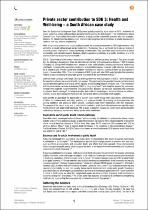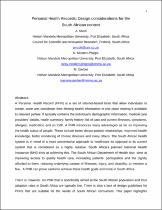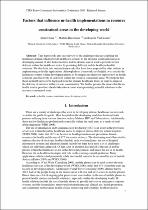 ResearchSpace
ResearchSpace
Private sector contribution to SDG 3: Health and Well-being – a South African case study
JavaScript is disabled for your browser. Some features of this site may not work without it.
- ResearchSpace
- →
- Research Publications/Outputs
- →
- Journal Articles
- →
- View Item
| dc.contributor.author |
Haywood, Lorren K

|
|
| dc.contributor.author |
Wright, C

|
|
| dc.date.accessioned | 2019-10-25T08:36:18Z | |
| dc.date.available | 2019-10-25T08:36:18Z | |
| dc.date.issued | 2019-09 | |
| dc.identifier.citation | Haywood, L. & Wright, C. 2019. Private sector contribution to SDG 3: Health and Well-being – a South African case study. South African Journal of Science, vol 115(9/10), pp. 1-3 | en_US |
| dc.identifier.issn | 0038-2353 | |
| dc.identifier.issn | 1996-7489 | |
| dc.identifier.uri | https://www.sajs.co.za/article/view/6452 | |
| dc.identifier.uri | https://doi.org/10.17159/sajs.2019/6452 | |
| dc.identifier.uri | http://hdl.handle.net/10204/11188 | |
| dc.description | © 2019. The Author(s). Published under a Creative Commons Attribution Licence. | en_US |
| dc.description.abstract | Since the Sustainable Development Goals (SDGs) were globally adopted by world leaders in 20151, worldwide the private sector has openly embraced them and committed to address the SDG targets2-4. The United Nations Global Compact5 lists 10 principles that enable businesses to adopt socially responsible practices into their strategies. Similarly, the Global Reporting Initiative is an internationally recognised set of guidelines to enable businesses to report on how they address sustainability.6 While it is primarily governments’ responsibility to provide the enabling environment for SDG implementation, they will not be achieved without private sector involvement.2 Businesses have a significant role to play as engines of economic growth, employment, finance, technology and innovation. They report their social contributions in annual sustainability and integrated reports. Because a healthy population contributes to a healthy workforce, it is in the interest of business to address human health.7-9 SDG 3 – Good Health and Well-being – seeks to ensure health and well-being at every life stage.10 This goal is broader than the Millennium Development Goals on child/maternal mortality and communicable diseases.11 SDG 3 includes 13 targets and 26 high-level indicators which address all major health priorities, including reproductive, maternal and child health; communicable, non-communicable and environmental diseases; universal health coverage; and access for all people to safe, effective, quality and affordable medicines and vaccines. Aspects of health are also captured in targets of several other SDGs.11 Interconnectedness of SDG 3 goals with other SDG goals highlights that population health is a major beneficiary of sustainable growth and central to the achievement of SDGs.12 Universal health coverage (SDG Target 3.8) is a unifying platform for making progress on SDG 313 and it emphasises the importance of universal access to health-care services. The private sector has provided financial mechanisms and has also provided expertise in enlarging human capacity and conducting research for health care.14 The contribution that the private sector can make to achieving SDG 3 is being recognised7,14 and should be reported by businesses. Through their corporate social investment (CSI) programmes, business can leverage capabilities that contribute to universal health coverage28, including innovative data collection technologies, enhanced disease surveillance, improved supply chain management practices for storage and delivery of essential health supplies. SDGs provide an opportunity for businesses to support public health through their value chains, communication activities, occupational health and safety practices, and employee benefits. By ensuring that employees have safe working conditions and access to health services, businesses build better relationships with their employees. The purpose of the current study was to understand the extent to which South African businesses explicitly report contributions to SDG global health objectives. This analysis is important because the country faces significant public health issues that cannot be overcome without private sector contribution. | en_US |
| dc.language.iso | en | en_US |
| dc.publisher | ASSAf | en_US |
| dc.relation.ispartofseries | Workflow;22703 | |
| dc.subject | Environmental health | en_US |
| dc.subject | Global health | en_US |
| dc.subject | Business | en_US |
| dc.subject | Public health | en_US |
| dc.subject | Sustainable development | en_US |
| dc.subject | Sustainable Development Goals | en_US |
| dc.subject | SDGs | en_US |
| dc.subject | Universal health coverage | en_US |
| dc.subject | Well-being | en_US |
| dc.title | Private sector contribution to SDG 3: Health and Well-being – a South African case study | en_US |
| dc.type | Article | en_US |
| dc.identifier.apacitation | Haywood, L. K., & Wright, C. (2019). Private sector contribution to SDG 3: Health and Well-being – a South African case study. http://hdl.handle.net/10204/11188 | en_ZA |
| dc.identifier.chicagocitation | Haywood, Lorren K, and C Wright "Private sector contribution to SDG 3: Health and Well-being – a South African case study." (2019) http://hdl.handle.net/10204/11188 | en_ZA |
| dc.identifier.vancouvercitation | Haywood LK, Wright C. Private sector contribution to SDG 3: Health and Well-being – a South African case study. 2019; http://hdl.handle.net/10204/11188. | en_ZA |
| dc.identifier.ris | TY - Article AU - Haywood, Lorren K AU - Wright, C AB - Since the Sustainable Development Goals (SDGs) were globally adopted by world leaders in 20151, worldwide the private sector has openly embraced them and committed to address the SDG targets2-4. The United Nations Global Compact5 lists 10 principles that enable businesses to adopt socially responsible practices into their strategies. Similarly, the Global Reporting Initiative is an internationally recognised set of guidelines to enable businesses to report on how they address sustainability.6 While it is primarily governments’ responsibility to provide the enabling environment for SDG implementation, they will not be achieved without private sector involvement.2 Businesses have a significant role to play as engines of economic growth, employment, finance, technology and innovation. They report their social contributions in annual sustainability and integrated reports. Because a healthy population contributes to a healthy workforce, it is in the interest of business to address human health.7-9 SDG 3 – Good Health and Well-being – seeks to ensure health and well-being at every life stage.10 This goal is broader than the Millennium Development Goals on child/maternal mortality and communicable diseases.11 SDG 3 includes 13 targets and 26 high-level indicators which address all major health priorities, including reproductive, maternal and child health; communicable, non-communicable and environmental diseases; universal health coverage; and access for all people to safe, effective, quality and affordable medicines and vaccines. Aspects of health are also captured in targets of several other SDGs.11 Interconnectedness of SDG 3 goals with other SDG goals highlights that population health is a major beneficiary of sustainable growth and central to the achievement of SDGs.12 Universal health coverage (SDG Target 3.8) is a unifying platform for making progress on SDG 313 and it emphasises the importance of universal access to health-care services. The private sector has provided financial mechanisms and has also provided expertise in enlarging human capacity and conducting research for health care.14 The contribution that the private sector can make to achieving SDG 3 is being recognised7,14 and should be reported by businesses. Through their corporate social investment (CSI) programmes, business can leverage capabilities that contribute to universal health coverage28, including innovative data collection technologies, enhanced disease surveillance, improved supply chain management practices for storage and delivery of essential health supplies. SDGs provide an opportunity for businesses to support public health through their value chains, communication activities, occupational health and safety practices, and employee benefits. By ensuring that employees have safe working conditions and access to health services, businesses build better relationships with their employees. The purpose of the current study was to understand the extent to which South African businesses explicitly report contributions to SDG global health objectives. This analysis is important because the country faces significant public health issues that cannot be overcome without private sector contribution. DA - 2019-09 DB - ResearchSpace DP - CSIR KW - Environmental health KW - Global health KW - Business KW - Public health KW - Sustainable development KW - Sustainable Development Goals KW - SDGs KW - Universal health coverage KW - Well-being LK - https://researchspace.csir.co.za PY - 2019 SM - 0038-2353 SM - 1996-7489 T1 - Private sector contribution to SDG 3: Health and Well-being – a South African case study TI - Private sector contribution to SDG 3: Health and Well-being – a South African case study UR - http://hdl.handle.net/10204/11188 ER - | en_ZA |








